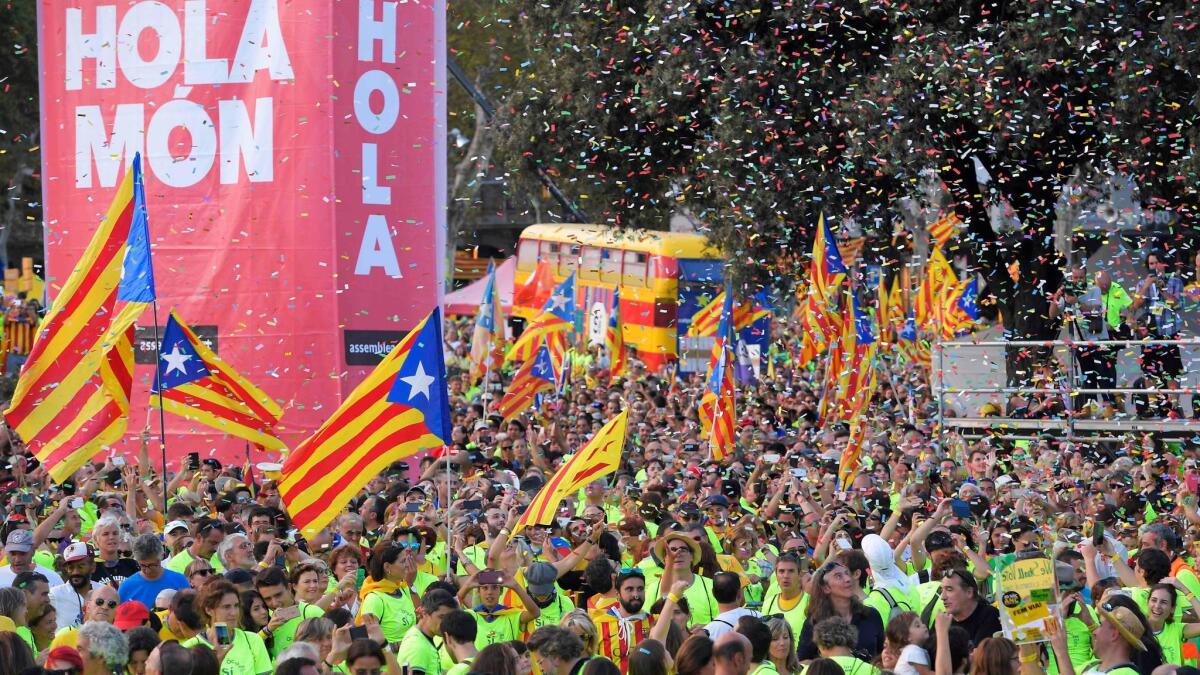Hundreds of thousands march in Barcelona for Catalonia independence

- Share via
Reporting from BARCELONA, Spain — They traveled down from the Pyrenees mountains and up from seaside pueblos along Spain’s northeastern coast, all in yellow separatist jerseys. With schools and offices shut for the day, children wore Catalan flags and rode on their parents’ shoulders. The elderly sang an anthem banned during their youth under the dictatorship of Gen. Francisco Franco.
Up to a million people rallied Monday in Barcelona, the capital of northeastern Spain’s Catalonia region, for the Diada — Catalonia’s national day. It commemorates the region’s loss of autonomy to Spain, after the 1714 Siege of Barcelona.
But the annual holiday took on fresh meaning this year, as Catalonia’s separatist leaders push ahead with plans for an independence referendum on Oct. 1 — in violation of Spanish law.
Over the weekend, Spanish Civil Guards raided printing offices across Catalonia, seeking to confiscate ballot papers. Organizers say the ballots are being prepared in secret.
Spain’s Constitutional Court suspended the vote last week, and prosecutors said they are preparing criminal charges against all Catalan government ministers.
In his annual Diada message, Catalonia’s regional president, Carles Puigdemont, insisted the vote would take place, because the regional parliament had determined it was legal. He has said he’s willing to go to prison for his role.
“This is a legal referendum, in accordance with the laws approved by the sovereign Parliament of Catalonia,” Puigdemont said. “No other judicial or political entity can bar my government from office.”
At exactly 5:14 p.m. — or 17:14 on a 24-hour clock to denote the year Spain took over — marchers donned fluorescent yellow T-shirts with separatist slogans and crowded into a downtown Barcelona intersection to form a giant plus sign visible in aerial photos. Organizers said they sold 300,000 yellow T-shirts. Local police said 1 million people participated, while the central government put the figure at 350,000.
Demonstrators also strung a banner across the front of the main Bank of Spain building downtown, renaming it the Bank of Catalonia. Masked members of a far-left group burned Spanish and European Union flags in the street, but the atmosphere was mostly peaceful.
Separatists paraded down Las Ramblas, the pedestrian thoroughfare where an Aug. 17 van attack for which the militant group Islamic State claimed responsibility left 15 people dead. There was a heavy police presence.
Like the Basque region to its west, Catalonia has its own language and culture, and has long sought autonomy from the Spanish central government based in Madrid. Under Franco’s nearly 40-year dictatorship, which ended in 1975, Catalan holidays, songs and language were banned in most public places.
More recently, this region of 7.5 million, with its capital, Barcelona, has become the most prosperous of Spain’s 17 autonomous regions, with an economy bigger than Finland’s. It accounts for about a fifth of Spanish gross domestic product, and more than a quarter of exports.
Many Catalans say they resent having their taxes subsidize poorer parts of Spain, especially after a punishing economic crisis.
“We want to be free, because we think we can live better,” said Mercedes Ramos, 43, who is half-Catalan and half-Spanish, and grew up in Catalonia.
Spanish politicians “don’t recognize our deficit,” Ramos said. “We put a lot of money in, and they don’t return it.”
Catalonia held a previous referendum in 2014, but it was a nonbinding “consultation,” and although the separatists won with more than 80% of the vote, turnout was low. Regional leaders say the Oct. 1 vote is legally binding and would trigger a transition to independence if the “yes” votes win.
Some anti-independence parties are encouraging their supporters to stay home Oct. 1.
Neither Spain nor any of its European Union allies are likely to recognize any new country of Catalonia. Catalan officials say they would hope to remain in the EU, and continue using the euro currency. For the EU to admit a new member state, the vote must be unanimous.
Polls show Catalans are roughly evenly divided over whether to break away from Spain and form a new country, but a majority support the idea of voting on it.
About a third of Catalan mayors, including Barcelona Mayor Ada Colau, have not yet granted permission for regional authorities to use municipal buildings for polling stations on Oct 1. Some have sought guarantees from regional authorities, for their workers. Spain has warned that any civil servants who administer the polling could be criminally liable.
“There is a strong division about the feeling for independence,” said Javier Castellanos, 55, who took advantage of Monday’s holiday to go for a midday swim, but did not participate in rallies. “There is a hint of superiority on the independence side. They’re talking about being the Denmark of the south, but we are a Mediterranean country! We have the same clientele politics and corruption as Madrid.”
Frayer is a special correspondent.
More to Read
Sign up for Essential California
The most important California stories and recommendations in your inbox every morning.
You may occasionally receive promotional content from the Los Angeles Times.










